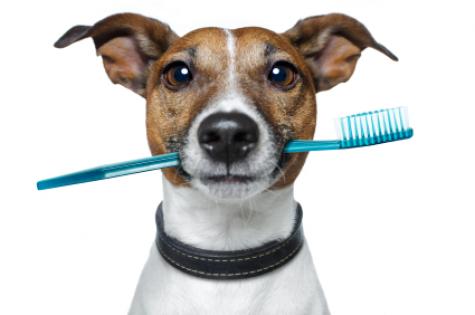Dogs and cats can't brush, spit, gargle or floss on their own. So owners who want to avoid bad pet breath need to lend a hand.
Puppies and kittens are born toothless. They get their baby teeth before they're a month old, lose them three to five months later and get their permanent teeth by age one. Dogs have 42 teeth and cats have 30.
"Brushing is the gold standard for good oral hygiene at home. It is very effective, but some dogs and even more cats don't appreciate having something in their mouth," says Dr Colin Harvey, a professor of surgery and dentistry in the Department of Clinical Studies at the University of Pennsylvania's School of Veterinary Medicine.
The bulk of bad breath odour - the trademark rotten egg smell - comes from hydrogen sulphide, which is waste from anaerobic bacteria that thrive without oxygen in places like gaps between teeth and gums. Plaque build-up also invites the bacteria and as the accumulation grows, so does the smell.
Professor Harvey says that bad breath could also be a symptom of an underlying medical problem.
Harvey, who is director of the Veterinary Oral Health Council (VOHC) in the US, says products such as chewy toys or ropes are good substitutes for a teeth-brushing. He suggests pet owners try these or use products such as water additives, plaque and tartar cleaners as an alternative to teeth cleaning if they are not able to do it.
Toy dogs tend to have more dental problems because breeding for their smaller size hasn't caught up with evolution, Professor Harvey says.
"Primitive dogs had a standard size and shape because they were evolved from wolves. But for toy breeds, their jaw size was reduced and tooth size was not so their teeth are too large for their mouths.”
Professor Harvey says it’s harder to clean cat teeth than a dog because cats' mouths are smaller, their teeth sharper and they couldn’t care less about bonding with a human during designated tooth time.
A child's toothbrush can be used for small pets and an adult size for big dogs, but don't use human toothpaste on pets, Professor Harvey warns.
Such toothpastes contain detergents that foam and pets will swallow it instead of spitting it out, he says. Professor Harvey suggests pet owners ask their vet for the best product available to clean their pet’s teeth but he says, just like humans, nothing beats brushing.








 Agree (0)
Agree (0) Disagree (
Disagree (









__small.png)










